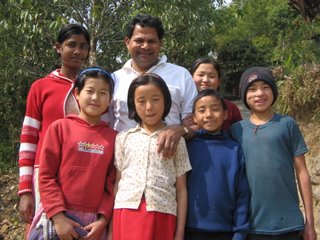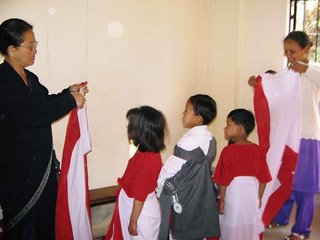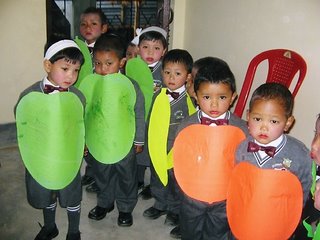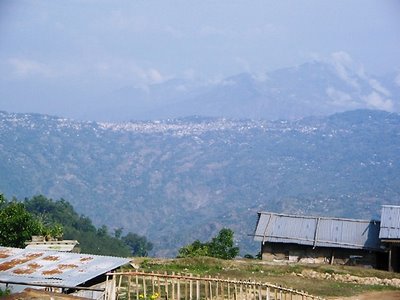

 Christmas Wishes
Christmas WishesFrom Hostel Children of St. Joseph's
Computer classes are on
a Saturday morning.
Only possible when the village has
an electricity supply.
They have many power cuts in the Hill Regions.
How to volunteer and support education in the Darjeeling Hill Region


 Christmas Wishes
Christmas Wishes
 A village view, the houses are spread out down the hillside.
A village view, the houses are spread out down the hillside. Don't know where the smiles have gone? They don't always have serious faces.
Don't know where the smiles have gone? They don't always have serious faces. Lots of Happy Faces
Lots of Happy Faces


How many of us can fit in this picture?

Down by the River in Git Dubling
 Outside the Hostel
Outside the Hostel

What have I found?
The children, of one of the hostels for St. stephen's School in Loly Goon, and I decided to have an outing to a nearby forest which had been developed to attract visitors.
 Getting ready for a Nepali Dance Routine
Getting ready for a Nepali Dance Routine

Infants ready to go on stage "Fruits of The Earth"
 Lining up for the Entrance Parade
Lining up for the Entrance Parade The boys from class UKG; even they get make up on.
The boys from class UKG; even they get make up on.
 A mixed age group; helping each other to apply the finishing touches.
A mixed age group; helping each other to apply the finishing touches.
Posting some pictures of the children of St. Joseph's getting ready for their annual school concert.
A lot of preparation goes into the presentation of this.
They, the pupils, give performancies using the English, Nepali and Hindi media; and use music,dance and drama.
Schools from all around this area come for the performance and parents and guardians are also invited. Because many of the visitors have to walk for several hours to get to St. Joseph's, they are offered a light snack and the adults tea and the children juice.
The residents of the village of Gitdubling all get together, build the stage, help get the pupils made up and into their costumes,which are all made on site, and help with the snacks,teas etc.
The concert is a wonderful opportunity for the pupils.staff and villagers to get together and show what can be achieved with lots of hard work and co-operation.
 They loved getting their photos taken
They loved getting their photos taken
St Joseph's hostel provides accommodation for approximately 84 pupils who attend St. Joseph's Sch. Many of the pupils live a long distance from the school and can not travel daily.
The Hostel consists of two long dormitories with bunk beds on either side of the room. The bunk beds are about 2 feet apart and there is no furniture in the dormitories except for the beds.
Any spare clothing is kept on the bottom of their bed.
Toilets and personal washing facilities are apart from the sleeping accommodation. The kitchen and hall for eating in are also in a separate building.
The residents spend much of their time out of doors or in a class room studying. They get about 2 hours homework every night. They all have to do odd jobs around the property, eg. collecting wood for the cooking stove, preparing vegetables,washing clothes etc.
When they do have spare time they love to sing and dance and the boys play, basket ball, football and cricket. The girls look after the younger residents. This keeps them very busy.

 A view from Gitdubling, West Bengal, overlooking St Joseph's School
A view from Gitdubling, West Bengal, overlooking St Joseph's School
Pupils from St. Joseph's School, Gitdubling, West Bengal
Gitdubling is a small market village surrounded by other small villages scattered around in the hills of the Kalimpong hill region.
Names of some of these villages: Nok, Pochok, Longsheol, Kaffer, Pakang and Dubling.
The whole area is very hilly and forested, and hard surfaced single track roads are few and far between.
The people from the surrounding villages depend on Gitdubling for:- shopping , market day is on a Wednesday, for religious celebrations and for schooling after they have completed grade 4 in the other village schools. St Joseph's School in Git Dubling takes the pupils up to grade 10.
Some of the villagers have to walk for up to 3 or 4 hours to reach Gitdubling and then walk home again carrying heavy loads ,supported by bandas around their foreheads, and mothers with babies strapped around their mid drift.